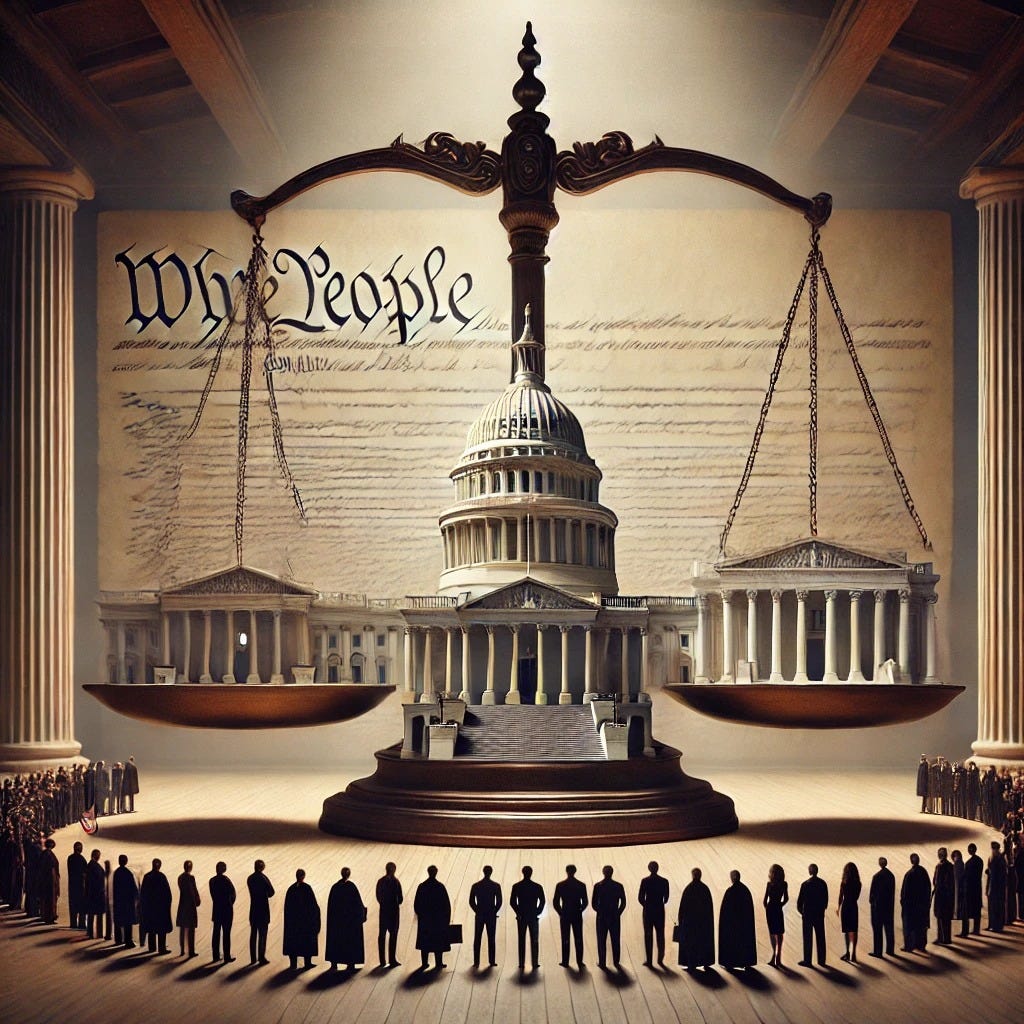✍️ The Constitution Is Clear: Power Must Be Shared, Not Seized
When one branch tries to silence the others, democracy is at risk.
The accumulation of all powers ... in the same hands ... may justly be pronounced the very definition of tyranny.
—James Madison, Federalist No. 47
The U.S. Constitution was built to prevent precisely what we’re seeing now: one person—or one branch—trying to grab too much power.
The Founders didn’t trust the government to police itself. That’s why they designed a system of separation of powers and checks and balances—not only among the federal branches but also between the federal government and the states.
Today, that system is under attack—distorted by disinformation (intentional lies), ignored by opportunists, and misunderstood by many people. We hear the president “can do whatever he wants.” That Congress is powerless, the courts are political, and the states don’t count.
We need to push back—with facts.
First published in early 2025 for another platform, this article remains an urgent reminder to us, the people we talk with and write to, and, especially, the people we elect.
What the Constitution Actually Says
The Constitution creates three branches:
Congress (Article I) makes laws.
The President (Article II) implements them.
The Courts (Article III) interpret them.
Each branch has limits—and tools to check the others.
How the System Keeps Power in Check
Here’s how the Constitution divides and balances power:
Congress:
Declares war (Article I, Section 8 )
Controls spending (Article I, Section 9)
Ratifies treaties, confirms appointments (Senate, Article II, Section 2)
Can impeach and remove officials (Article I, Sections 2–3)
Overrides vetoes (Article I, Section 7)
President:
Can veto laws (Article I, Section 7)
Appoints judges and officials (with Senate approval)
Commands the military—but can’t declare war
Issues executive orders (subject to court review and congressional limits)
Courts:
Strike down unconstitutional laws or actions (Marbury v. Madison, 1803)
Judges serve for life to stay independent (Article III)
States:
Ratify amendments (¾ vote required – Article V)
Run elections, including the Electoral College (Article II, Section 1, 12th Amendment)
Retain powers not given to the federal government (10th Amendment)
Can sue the federal government—and win
This system isn’t optional. It’s how democracy survives.
“The primary takeaway from the past 250 years of recorded American history is that Presidents are not kings.”
—Judge Ketanji Brown Jackson, 2019
The Threat of Constitutional Amnesia
Too many Americans—including elected officials—don’t understand or respect those limits. That creates space for abuse.
We’re now seeing efforts to undermine the courts—calling for the impeachment of judges who rule against Trump, suggesting they’re “partisan,” or threatening to defund them. That is an attack on judicial independence—and a warning sign of autocracy.
The courts are a cornerstone of the Constitution. If judges can be punished for doing their jobs, the whole system collapses.
Even in crisis, courts have ruled on presidential power—from Nixon’s resignation to the disturbing July 2024 Supreme Court decision on presidential immunity for "official acts" while in office. But the message must remain: No one is above the law.
And we must not forget that now.
What You Can Do
Know the basics. The Constitution is short and clear.
Speak up. Don’t let false claims go unchallenged.
Share facts. Use this article and the links below as a reference.
Support accountability. Vote for people who respect limits on power—not those who try to break them.
I write this not just as a concerned citizen but also as someone who studied political science (and journalism) in college and spent 35 years reporting on and working in local government. I’ve seen how much depends on understanding the system—and what can go wrong when we don’t.
The Constitution still speaks. We must make sure it’s heard.
Trusted Resources
National Archives: Founding Documents – Full official text of the Constitution, Bill of Rights, and Declaration of Independence.
National Constitution Center – Annotated Constitution, nonpartisan and user-friendly.
Civics 101 Podcast – Clear, accessible breakdowns of how government works.
Constitution Annotated – In-depth legal commentary from the Library of Congress.
Advocacy Groups
Executive Overreach & Abuse of Power
A ranked guide to organizations resisting authoritarianism and defending democratic norms.
A ranked guide to legal groups challenging anti-democratic policies and abuses of power.


